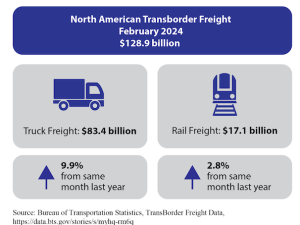Tom Finkbiner, Senior Chairman of the Board of the Intermodal Transportation Institute (ITI) at the University of Denver, recently told the sixth annual Indiana Logistics Summit in Indianapolis, presented by the Port of Indiana and Purdue University, that the State of Indiana is well-positioned to take advantage of intermodal rail development opportunities relative to other states in the region in terms of population and freight density.
The summit brought together leaders from the worlds of industry, academia, public policy and government to discuss how to make Indiana's transportation, distribution and businesses more competitive in the world of logistics. Attendees heard Finkbiner tell them that 'like all freight, intermodal transportation development occurs where the densest population resides to meet consumer demands. Freight distribution patterns, however, are compounded by what the industry calls 'to and through traffic' ' business that is related to population centers, but redistributed to other locations.'
In the Midwest, Finkbiner said Chicago has traditionally had a huge competitive advantage as an intermodal hub, with truck and rail connections throughout North America.''All seven of the major Class I railroads in North America have a terminus in Chicago,' he pointed out, 'making Chicago the natural North American hub for rail freight, with 20 intermodal terminals located in and around the city. This is a factor that Indiana cannot replicate, as it currently has only two such terminals ' one in Indianapolis. Railroads have also grown 85 percent in terms of tonnage handled since deregulation in 1980, which only further adds to the freight congestion in Chicago.'
Due to Chicago's major terminus advantage and this significant growth in rail traffic, Finkbiner pointed out that critical rail and highway congestion continues to exacerbate in the Chicago hub, earning it the nickname of the 'Black Hole' for freight and opening up much needed opportunities for other demographically and geographically attractive areas to develop intermodal facilities and services.
Finkbiner closed his remarks by saying, 'While it is not my job to tell individual regions what their intermodal plans should be, I will say that opportunities for alternative intermodal operations exist due to the congestive nature of the Chicago hub's current infrastructure.'There are factual reasons that will enable Chicago to remain a critical freight hub; but there are real opportunities for Indiana to develop its own intermodal facilities and services to help alleviate problems associated with the massive congestion problems that the Chicago hub is saddled with. The message for Indiana's public policymakers and logistics developers is to understand that simply providing money and facilities will not guarantee bringing additional intermodal freight or services to the state, however.'To do so will require the development of carefully thought-out, intelligent transportation systems that are multi-modal, interconnected, energy-efficient, and most of all, consumer responsive in nature if the region is going to benefit from new intermodal opportunities.'







